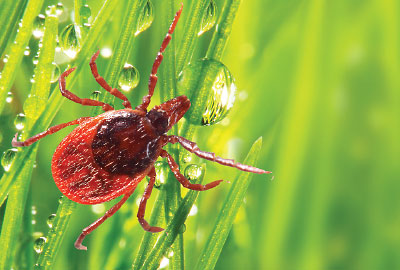For Colleen Eve Fischer Hoffman, her symptoms started with debilitating fatigue. She began falling asleep at work and in class, and some days she was so tired she couldn’t drive. She began experiencing leg pain and numbness in her hands. Her primary care physician ordered a battery of tests, even a sleep study, yet no answers were found.
After years of symptoms, Hoffman said one night she reached “rock bottom” and began to explore ways of taking her own life, she told Psychiatric News. Instead, she reached out to a therapist friend who saw her immediately and helped redirect her to a new game plan. Eventually she was diagnosed with Lyme disease, began seeing an infectious disease specialist, and found treatment.
Hoffman may not be alone in her experience: A study published July 28 in AJP in Advance found that patients who suffered severe Lyme disease infection were 28% more likely to develop subsequent mental disorders—and twice as likely to attempt suicide—than those without the vector-borne disease. The analysis also revealed such patients also had a 42% higher rate of affective disorders and a 75% higher rate of death by suicide. “Notably, the rate for affective disorders was highest during the first year after diagnosis and highest for completed suicide during the first three years after diagnosis,” authors wrote.
“Clinicians should include Lyme disease in the differential diagnosis of individuals with a psychiatric disorder associated with multi-system symptoms,” study author Brian A. Fallon, M.D., M.P.H., director of the Center for Neuroinflammatory Disorders and Biobehavioral Medicine at Columbia University, told Psychiatric News. “Sometimes mental health professionals are the first to consider Lyme disease, and that attentiveness can lead to diagnosis and appropriate antibiotic therapy.”
For the study, researchers analyzed 22 years of medical records for the nearly 7 million people living in Denmark; it is believed to be the first large population-based analysis examining the relationship between Lyme disease and psychiatric outcomes. About 12,600 individuals had received a hospital-based diagnosis.
“Our results are not surprising, given that individuals with hospital-based diagnoses of serious infections are known to have an increased risk of subsequent affective disorders and suicide,” Fallon said. The study results may not be generalizable to potentially less severe cases of Lyme disease that were handled outside the hospital.
In the United States, the Centers for Disease Control and Prevention estimates that nearly half a million people a year are treated for Lyme disease (also known as Lyme borreliosis), which makes it the most common vector-borne disease. Due to climate change, the areas where Lyme disease is common are expanding.
Despite the link between Lyme disease and mental disorders, the absolute population risk is low: just under 7% of patients in the Denmark study diagnosed with Lyme in the hospital went on to develop new onset mental disorders requiring hospital contact, amounting to 831 patients.
“These absolute numbers would be larger if it had been possible to include in the analysis mental health issues not requiring hospital contact,” Michael Eriksen Benros, M.D., Ph.D., head of research and a professor of immuno-psychiatry at the Copenhagen Research Centre for Mental Health in Denmark, told Psychiatric News.
According to the Global Lyme Alliance (GLA), which funded the study, Lyme disease cases in Europe are caused by Borrelia garinii and Borrelia afzelii. However, the Borrelia burgdorferi strain that dominates in North America is associated with greater inflammation, so it may be possible that the risk of mental disorders and suicidality is greater in the United States than that observed in Denmark, according to the GLA.
As for Hoffman, she is now doing better. She credits her psychotherapist, in part, with her recovery. “It’s been a long haul,” she said. “What really helped me was talking about it with people who got me.”
The study was funded by GLA and an unrestricted grant from the Lundbeck Foundation. ■
“Lyme Borreliosis and Associations With Mental Disorders and Suicidal Behavior: A Nationwide Danish Cohort Study” is posted
here.
The statement from the Global Lyme Alliance is posted
here.

